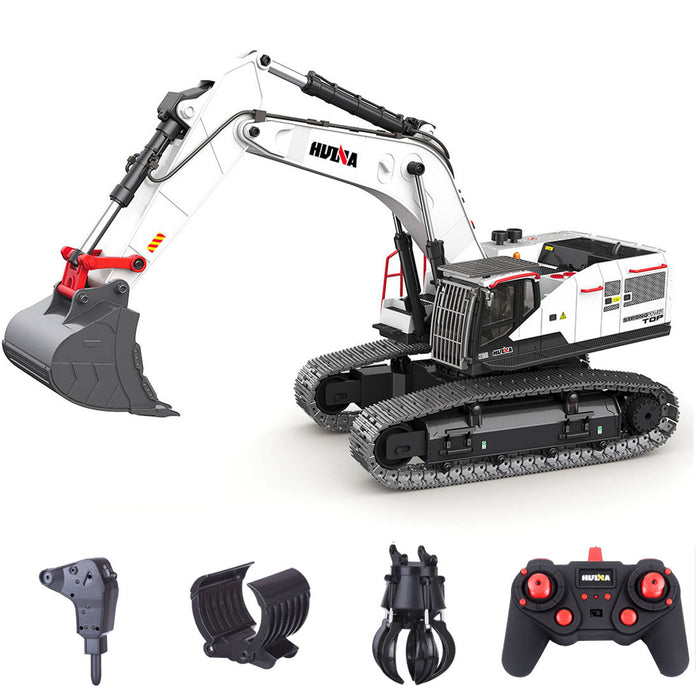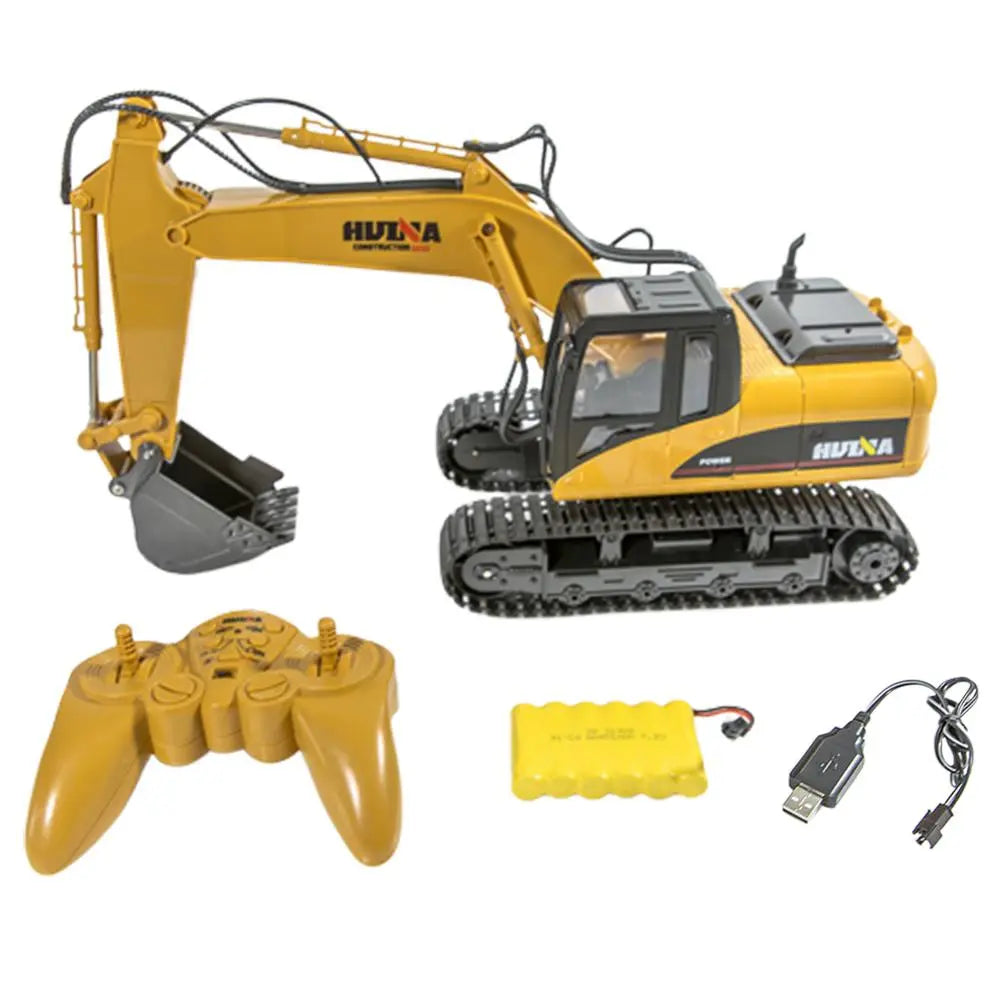Comprehending Just How Excavator Works and Its Influence on Efficiency
Excavators play a necessary function in building and construction and mining procedures, counting on a complex interaction of mechanical and hydraulic systems. Their capability to perform a range of jobs rests on both their design and the modern technology integrated within. Recognizing these parts can significantly impact functional performance and productivity. As improvements remain to improve the sector, one need to consider just how these changes will affect future methods and performance.
The Fundamentals of Excavator Mechanics

The Role of Hydraulic Equipments in Excavators
At the heart of excavator operation lies the hydraulic system, which plays an essential duty in powering the device's motions and features. This system uses pressurized hydraulic liquid to move power, enabling various activities such as digging, lifting, and swinging. By utilizing the principles of hydraulics, excavators can do jobs with remarkable precision and force, improving general functional efficiency.The hydraulic system is composed of essential elements, consisting of pumps, cylinders, and shutoffs, which interact to control the flow and instructions of the liquid. When the operator involves the controls, the hydraulic liquid is routed to details cyndrical tubes, translating the driver's commands right into physical activity. This system permits for responsive and smooth activities, which are important in construction and excavation settings. double e volvo rc excavator. The efficiency of the hydraulic system directly affects the efficiency and flexibility of the excavator, making it a vital aspect in modern-day excavation procedures
Key Elements of an Excavator
Comprehending the crucial parts of an excavator is essential for realizing just how this powerful machine runs. An excavator is composed of several substantial elements, including the undercarriage, residence, bucket, boom, and arm. The undercarriage offers stability and movement, commonly featuring tracks or wheels to navigate various terrains. Your home includes the engine and hydraulic systems, permitting the operator to regulate movement and power the machine. The boom prolongs from your house, making it possible for vertical reach, while the arm attaches to the container, helping with digging and training operations.Additionally, the taxi houses the operator, geared up with controls for exact maneuvering. Each of these elements plays a crucial role in the excavator's total performance, adding to its efficiency and efficiency on building and construction sites. Recognizing these components helps in enhancing and keeping excavator efficiency, making certain tasks are finished securely and effectively.
Accessory Versatility and Its Advantages
Attachment adaptability is an essential element of excavators, making it possible for drivers to change in between numerous tools customized for certain jobs. This versatility not only improves task effectiveness however likewise adds to cost-effectiveness by minimizing the requirement for several makers. Comprehending the different sorts of attachments available can significantly affect the total performance and functionality of an excavator on job sites.
Types of Attachments
While excavators are mainly recognized for their digging capabilities, their true flexibility hinges on the wide selection of add-ons offered. These accessories boost the excavator's capability, permitting it to execute numerous jobs past excavation. Typical add-ons consist of pails (for excavating and scooping), hydraulic thumbs (for grasping products), and augers (for piercing holes) Grapples are utilized for moving and handling particles, while rippers can separate difficult surfaces. Other specialized attachments, such as trenchers and rakes, allow excavators to adapt to certain task needs. This diversity not just boosts the maker's utility throughout different industries, consisting of demolition, construction, and landscape design, yet likewise permits operators to customize their tools to satisfy details task demands successfully.
Enhanced Work Efficiency
Making best use of task efficiency is a primary benefit of using numerous excavator accessories. Various attachments allow an excavator to carry out numerous tasks without needing to switch over devices, conserving important time and labor. Making use of a hydraulic hammer can break concrete while a pail add-on can dig deep into soil, allowing a smooth operations. This versatility reduces downtime related to tools changes and improves performance on-site. Additionally, specialized accessories improve precision in jobs such as grading or landscape design, causing better outcomes. The capability to adjust to numerous job requirements not only enhances operations but also decreases the requirement for extra equipment, making sure that tasks are finished promptly and effectively. Overall, attachment flexibility significantly adds to enhanced task performance in excavation job.
Cost-Effectiveness and Convenience
Cost-effectiveness is a substantial advantage of making use of functional excavator add-ons. These add-ons permit a single excavator to execute numerous tasks, decreasing the need for added equipment and labor - double e volvo rc excavator. By switching in between pails, hammers, and grapples, operators can take on numerous jobs, from digging to demolition, therefore maximizing tools usage. This adaptability not just lowers find more info functional expenses but additionally lessens downtime connected with transforming tools. In addition, the capacity to customize excavators with specialized add-ons improves efficiency, as they can effectively manage varied jobs according to project needs. To wrap up, the mix of cost-effectiveness and adaptability in excavator attachments adds to improved functional efficiency and source allotment in construction and excavation jobs

Advanced Technology in Modern Excavators
Modern Get More Info excavators are increasingly equipped with innovative innovation that transforms excavation procedures. Automation improves procedures, while improved fuel effectiveness reduces functional expenses. Additionally, clever control systems enhance precision and safety and security, noting a considerable development in excavation equipment.
Automation in Excavation Processes
As excavation innovation develops, automation has actually become a crucial part in boosting efficiency and accuracy on job websites. Modern excavators are geared up with advanced automated systems that assist in tasks such as grading, excavating, and trenching with very little operator treatment. These systems utilize sensing units, GPS, and maker learning formulas to assure precise placing and deepness control, greatly minimizing the margin for mistake. Additionally, automation permits drivers to concentrate on strategic decision-making instead of manual controls, leading to enhanced performance overall. Such advancements not just improve process but also improve safety by decreasing human error in complicated operations. The combination of automation in excavation procedures represents a considerable development in building and construction innovation, driving the market in the direction of better performance and effectiveness.
Enhanced Gas Performance
Advancements in modern technology have actually also resulted in considerable improvements in fuel efficiency for modern excavators. Modern devices are equipped with advanced engines that optimize power result while reducing fuel consumption. These engines use cutting-edge combustion modern technologies, such as turbocharging and direct fuel shot, to enhance performance and performance. Furthermore, lightweight products in building and construction reduce general weight, permitting for much less power expense during operation. The intro of variable rate controls allows drivers to change engine efficiency according to details jobs, further decreasing fuel use. Therefore, these enhancements not only lower operational prices however additionally add to environmental sustainability by decreasing exhausts. Generally, boosted gas performance in excavators is a crucial development that reinforces productivity and financial feasibility in the construction sector.
Smart Control Systems
While drivers navigate progressively complex job sites, wise control systems in excavators have actually emerged as essential devices for improving efficiency and precision. These advanced innovations utilize algorithms and sensors to check various parameters such as tons weight, terrain problems, and functional efficiency. By instantly changing hydraulic features, clever systems maximize device performance, leading to boosted productivity and reduced wear on elements. Furthermore, operators take advantage of intuitive interfaces that give real-time responses and diagnostics, enabling informed decision-making. This assimilation of technology not just simplifies procedures yet likewise reduces human mistake, adding to more secure workplace. As the building market proceeds to progress, wise control systems will certainly play a crucial function fit the future of excavator performance and efficiency.
Enhancing Operational Performance With Excavators
Excavators play a vital role in boosting operational efficiency across different construction and excavation jobs. Their flexibility permits multiple tasks, consisting of digging, product, and training handling, which streamlines process and reduces the need for additional devices. With effective hydraulic systems, excavators can carry out durable tasks with accuracy, significantly decreasing the moment needed to total projects. The integration of advanced technology, such as GPS and automated controls, better maximizes their procedure, allowing drivers to attain greater precision and reduce product waste. Additionally, modern-day excavators are designed to consume less fuel and reduce exhausts, contributing to both cost savings and ecological sustainability. By using excavators effectively, building and construction teams can improve efficiency, meet task due dates, and improve overall website monitoring. This multifunctionality and efficiency make excavators important devices in the modern construction landscape.
The Future of Excavators in Construction and Mining Industries
As the construction and mining industries develop, the future of excavators is poised for significant improvement driven by technical development and transforming operational demands. Developments in automation and expert system are reshaping excavator capabilities, permitting boosted accuracy and efficiency in operations. Independent excavators are emerging, minimizing the demand for human treatment and decreasing the risk of anchor accidents.Moreover, the assimilation of telematics and IoT innovation enables real-time surveillance of maker efficiency and predictive maintenance, enhancing uptime. Green layouts, consisting of hybrid and electric versions, are getting traction, lining up with sustainability goals within the industry.Additionally, making use of advanced materials and lighter layouts enhances gas efficiency while maintaining performance standards. As these fads development, excavators will play a crucial duty in satisfying the increasing demands for efficiency and security in building and construction and mining, ultimately transforming functional landscapes.
Regularly Asked Questions
Just How Do Weather Influence Excavator Efficiency?

Climate condition substantially affect excavator performance, as rain and mud can prevent traction and security, while extreme temperature levels might impact hydraulic systems. Operators needs to adapt to these variables to ensure suitable capability and safety and security during operations.
What Safety Procedures Should Operators Adhere To While Using Excavators?
Precaution for excavator drivers include using ideal personal safety devices, performing pre-operation evaluations, ensuring proper communication with ground workers, maintaining a secure range from overhead dangers, and adhering to established operational procedures to avoid crashes.
Exactly How Frequently Should Excavators Be Maintained for Optimal Efficiency?
Excavators need to be maintained regularly to assure peak efficiency, normally every 250 operating hours or as specified by the maker. Routine checks improve reliability, stop unexpected break downs, and prolong the life expectancy of the equipment.
What Is the Typical Life-span of an Excavator?
The typical lifespan of an excavator usually ranges from 10,000 to 15,000 hours of operation. Aspects influencing longevity include maintenance techniques, operating conditions, and the quality of the device itself, affecting general performance and effectiveness.

Can Excavators Operate Uneven Terrain Properly?
Excavators can run effectively on uneven surface because of their articulated layouts and flexible tracks. These features allow them to keep stability and grip, allowing effective operation in challenging environments typically run into in building and construction and landscape design tasks. Each of these parts plays a crucial duty in the excavator's overall capability, contributing to its performance and performance on building websites. Making the most of work performance is a key benefit of utilizing various excavator add-ons. While operators navigate significantly complex task sites, wise control systems in excavators have arised as crucial devices for boosting efficiency and accuracy. Excavators play an important role in enhancing functional efficiency throughout numerous construction and excavation tasks. Advancements in automation and synthetic intelligence are reshaping excavator capabilities, enabling for enhanced accuracy and efficiency in operations.